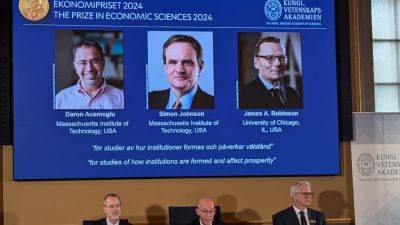Nobel economics prize awards notion of Western supremacy
Daron Acemoglu, Simon Johnson and James Robinson have been awarded the 2024 Nobel memorial prize in economics for their influential work on how institutions shape economic development. Some would say the decision to award these scholars the Nobel was long overdue.
The paper that formed the basis of their work is one of the most cited in economics. Acemoglu and Robinson’s subsequent book, Why Nations Fail, has also been hugely influential.
These works have inspired a rich debate on the relationship between societal institutions and economic development – so in that sense, congratulations are in order. But they have also been the subject of substantial criticism. In the aftermath of the award, it is fitting to highlight the blind spots in their analysis.
The most important piece of criticism concerns the connection between the quality of a country’s societal institutions and its level of economic development. Acemoglu, Johnson and Robinson’s work divides institutions into two categories: “inclusive” and “extractive.”
Inclusive institutions – such as those that enforce property rights, protect democracy and limit corruption – foster economic development, according to the laureates. In contrast, extractive institutions, which give rise to a high concentration of power and limited political freedom, seek to concentrate resources in the hands of a small elite and thus stifle economic development.
The laureates claim the introduction of inclusive institutions has had a positive long-term effect on economic prosperity. Indeed, these institutions are today found primarily in high-income countries in the west.
A huge problem with this analysis, however, is the claim that certain institutions are a precondition for economic







